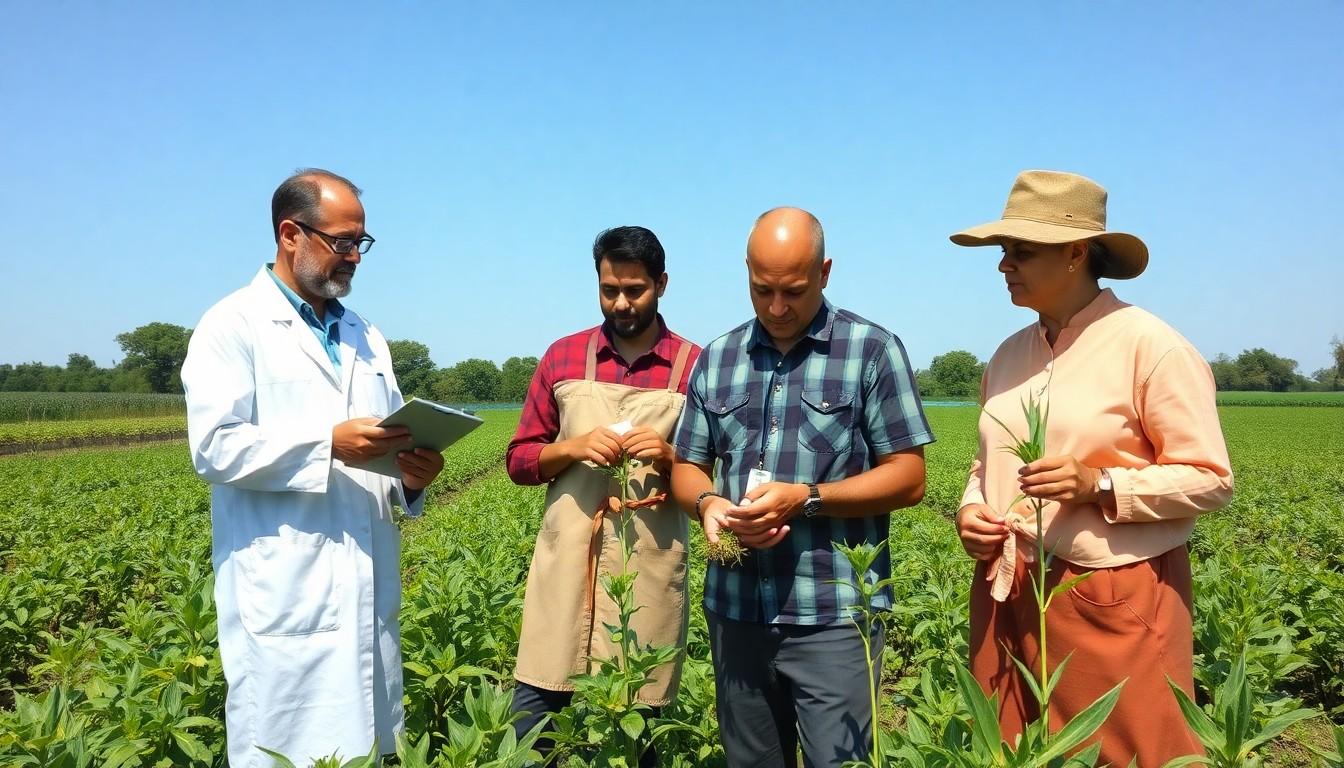In a world where technology and nature collide, nature biotech emerges as the superhero we didn’t know we needed. Imagine harnessing the power of plants and microbes to tackle some of humanity’s biggest challenges—like climate change, food scarcity, and even pesky pests. It’s like Mother Nature teamed up with a lab coat-wearing scientist to create a greener, more sustainable future.
But don’t let the term “biotech” scare you off. This isn’t just for the science geeks; it’s for anyone who enjoys fresh produce without the extra chemicals or wants to breathe cleaner air. As nature biotech continues to evolve, it’s proving that innovation and sustainability can go hand in hand—like peanut butter and jelly, but way more eco-friendly! Dive into the fascinating world of nature biotech, where the solutions to global problems are sprouting right from the ground.
Table of Contents
ToggleOverview of Nature Biotech
Nature biotech integrates biological processes with technology to tackle global challenges, such as climate change, food scarcity, and pest management. It harnesses the potential of plants, microbes, and other natural elements alongside scientific innovations. Various applications demonstrate this approach, including biofertilizers, biopesticides, and genetically modified crops designed for resilience.
This field emphasizes sustainability and environmental health. Products derived from nature biotech can enhance agricultural yield while minimizing chemical usage. Moreover, cleaner air can result from innovations that utilize microbial processes to break down pollutants.
Collaboration among scientists, farmers, and technologists facilitates advancements in nature biotech. Sharing knowledge encourages the development of strategies tailored to specific ecosystems and communities. The accessibility of these solutions benefits not only agricultural experts but also consumers interested in healthier food options.
Research supports claims of increased crop resilience and reduced resource consumption attributed to nature biotech. Numerous studies reveal that biopesticides can lower insect populations without harming beneficial organisms, preserving biodiversity. According to industry reports, the global market for biofertilizers is projected to reach $3 billion by 2025, reflecting growing awareness and demand.
Innovations are continuously emerging in this dynamic field. Recent breakthroughs involve synthetic biology, where scientists design microorganisms to produce biofuels efficiently. These advancements point toward a future where nature biotech plays a crucial role in combating pressing environmental issues. Efforts toward public education can further promote understanding and acceptance of these technologies.
Recent Innovations in Nature Biotech

Nature biotech showcases several innovative advancements addressing global challenges. Shifts in technology and biology enable remarkable solutions for sustainable practices.
CRISPR Technology
CRISPR technology revolutionizes genetic engineering by enabling precise modifications in organisms. This method allows scientists to target specific genes responsible for desirable traits in crops. Enhanced resistance to pests and diseases shows the potential for higher yields. Research indicates that CRISPR-edited plants can withstand climate variability better than traditional varieties. Studies document that using CRISPR results in minimal off-target effects, ensuring safety for ecosystems. This approach streamlines crop improvement, making it a critical tool in nature biotech.
Synthetic Biology Applications
Synthetic biology applications in nature biotech present innovative methods for environmental solutions. Engineering microorganisms to produce eco-friendly biofuels is one significant advancement. These engineered organisms can convert waste into renewable energy efficiently. Applications extend to developing biodegradable plastics, reducing reliance on fossil fuels. Research highlights the potential for synthetic biology to enhance nutrient cycling in agricultural systems. These advancements foster a cleaner planet while improving sustainability across various industries.
Benefits of Nature Biotech
Nature biotech offers numerous benefits that enhance both environmental health and human wellness. By merging biological processes with technological innovation, it significantly contributes to sustainability and health advancements.
Environmental Sustainability
Nature biotech plays a crucial role in promoting environmental sustainability. It enhances agricultural yields while using fewer synthetic chemicals, leading to healthier ecosystems. Biofertilizers improve soil quality, fostering biodiversity and resilience among crops. Biopesticides effectively manage pest populations, protecting beneficial insects and preserving ecological balance. Innovations such as engineered microorganisms also help produce biofuels, reducing reliance on fossil fuels. With the global market for biofertilizers set to reach $3 billion by 2025, there’s growing recognition of nature biotech’s potential to support sustainable agricultural practices.
Health Advancements
Advancements in nature biotech facilitate significant health improvements. CRISPR technology allows for precise genetic modifications in crops, enhancing nutrition and disease resistance. Research shows these crops yield better results in diverse climates, offering stability in food supplies. Healthier produce results from reduced chemical pesticide use, which minimizes health risks for consumers. Emerging synthetic biology applications produce biodegradable plastics, contributing to reduced environmental waste. These innovations underline the importance of integrating nature into biotechnological processes, ensuring that health and environmental benefits go hand-in-hand.
Challenges in Nature Biotech
Nature biotech faces several challenges that hinder its growth and implementation in various sectors. These obstacles include ethical concerns and regulatory hurdles that require ongoing attention.
Ethical Concerns
Ethical concerns often arise regarding genetic modifications in crops. Critics argue about the long-term impacts on biodiversity and ecosystem balance. Stakeholders express worries about the safety of genetically modified organisms (GMOs) and their effects on health. Issues like potential monopolies created by biotech companies pose risks to farmer independence. Addressing public apprehensions and fostering open dialogue can help build trust in nature biotech innovations. Transparency in research, safety assessments, and long-term studies is essential to alleviate fears. Balancing innovation with ethical responsibility remains a top priority for advancing this field.
Regulatory Hurdles
Regulatory hurdles continue to challenge the nature biotech landscape. Governments around the world impose strict guidelines for the approval of new biotech products. Compliance with these regulations can be time-consuming and costly for companies in the field. Varying regulations across countries complicate international trade and research collaboration. Many biotech firms work tirelessly to navigate these regulatory frameworks while ensuring product safety and efficacy. Effective communication with regulatory bodies can streamline the approval process. Establishing harmonized regulations may facilitate faster access to innovative solutions in agriculture and sustainability.
Future Trends in Nature Biotech
Emerging trends in nature biotech shape a sustainable future. Cell-based agriculture promises reduced environmental impact by producing meat alternatives without animal farming. This advancement addresses ethical concerns while offering sustainable protein sources.
Enhanced crop varieties through CRISPR technology lead to improved drought and pest resistance. Research shows that these plants withstand climate extremes better, ensuring food security. Plants engineered for better nutrition contribute to public health, reducing the need for synthetic fertilizers and pesticides.
Using microorganisms for specific agricultural applications is on the rise. These engineered microbes enhance soil health, promoting nutrient availability while reducing chemical agricultural inputs. Studies suggest these innovations could improve yields and foster biodiversity.
Microbial solutions for environmental cleanup gain traction. Bioremediation, involving microorganisms to break down pollutants, offers a feasible solution for soil and water contamination. This approach aligns with global sustainability goals, reinforcing the commitment to cleaner ecosystems.
Collaboration across disciplines strengthens the field of nature biotech. Partnerships between scientists, farmers, and policymakers lead to tailored solutions for local agricultural challenges. Successful projects often rely on community engagement, fostering awareness and acceptance of innovative practices.
Market projections indicate substantial growth in the nature biotech industry. Analysts expect the biofertilizer market alone to reach $3 billion by 2025. Such developments reflect growing consumer demand for eco-friendly agricultural products and methods.
Addressing regulatory hurdles remains essential for future progress. Harmonizing international guidelines aids in streamlining the approval process for innovative biotech products. Clear communication with regulatory bodies fosters quicker access to solutions benefiting agriculture and the environment.
Investing in education about nature biotech enhances public understanding and acceptance. Awareness campaigns promote the advantages while addressing concerns surrounding genetic modifications and their impacts on biodiversity. Engaging the public builds trust, crucial for future advancements in biotechnology.
Nature biotech stands as a beacon of hope for a sustainable future. By harmonizing natural processes with technological advancements, it addresses pressing global issues like food security and environmental health. The potential for healthier crops and cleaner ecosystems is immense, but realizing this potential requires collaboration and transparency among all stakeholders.
As the market for nature biotech continues to expand, so does the need for informed public discourse on its benefits and challenges. Embracing these innovations not only enhances agricultural resilience but also fosters a healthier planet. With ongoing research and development, nature biotech is poised to redefine the relationship between humanity and the environment, paving the way for a more sustainable tomorrow.



